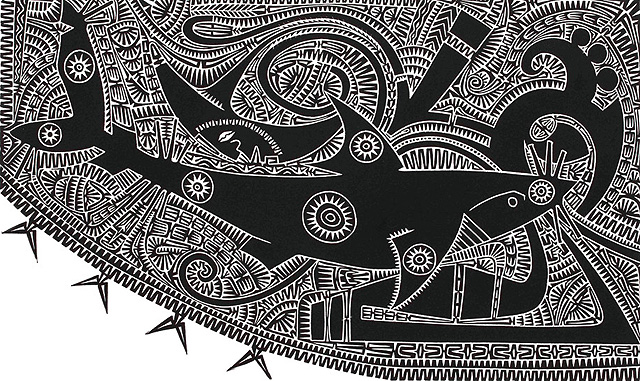 |
| Baidam painting by Dennis Nona. |
In the astronomical traditions of Torres Strait Islanders, Baidam is a shark. The shark constellation consists of seven stars. The stars of Baidam were used for navigation and provided knowledge about the seasons and for gardening fruit and vegetables. In about July/August Baidam will level itself across the horizon of New Guinea [to the north]. At seven or eight o'clock you will see it parallel to New Guinea. At this time the wind drops. Around this time we begin planting vegetables and fruit: Cassava, Dawai(banana), Guru (sugar cane), Taro/Urrgubau (sweet potato). Those are the main ones planted when the shark lies across the horizon. When it becomes calm in the Torres Strait, around this time, a grease forms on the surface of the sea. I have shown this in the artwork. The grease is called "Baidam aw id" - "when the shark liver has melted on the sea". At this time it is also shark mating season: a dangerous time in the sea. The shark constellation rotates throughout the year. In February, when you see the stars beginning to shine, that's the shark. (Account by Dennis Nona)
 |
| Baidam artwork by Brian Robinson. |
Editor's note: Some of the accounts identify the seven stars in question as the Seven Sisters (the Pleiades). This seven stars of Baidam are actually the seven bright stars of the "Big Dipper" (the brightest stars of the Western constellation Ursa Major - the Big Bear). From the Torres Strait, these stars appear low on the horizon to the north and coincide precisely with the description above. Because the Pleiades are commonly associated with seven stars, they are sometimes conflated with with Baidam. It doesn't help that when scaled to the same size, the Pleiades and the Big Dipper look very similar! (See below.) In Torres Strait traditions, the Pleiades star cluster is called Usiam. - Duane Hamacher
Pleiades Big Dipper

